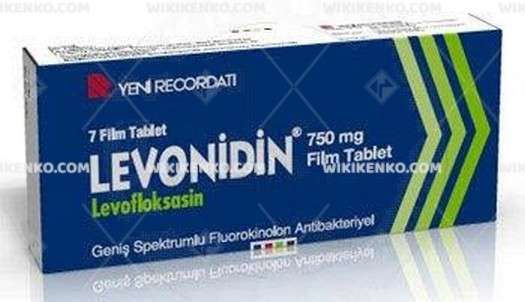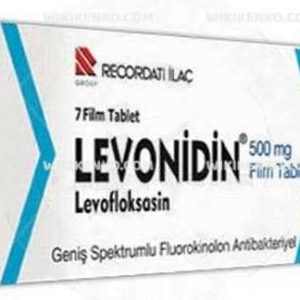Levonidin Film Tablet 750 Mg
When it comes to battling infections, having the right pharmaceutical ally can make all the difference. Enter Levonidin, a versatile film tablet containing 750 mg of levofloxacin hemihydrate, equivalent to 750 mg of levofloxacin. In this comprehensive guide, we delve into exploring its composition, applications, mechanisms, precautions, side effects, recommended treatment duration, and proper storage practices.
| Dosage form | |
|---|---|
| Pack size | |
| Potency | 750 Mg |
| Manufacturer | Recordati Ilac |
| Origin | Turkey |
| Generic Name (Ingredient) | Levofloxacin Hemihydrate 768.45 Mg (Equivalent To 750 Mg Levofloxacin) |
Assuming your emergency circumstances for this product, visit Urgent Quotation page. Besides, for any pharmaceutical questions, please ask us in the comments section.
Description
Levonidin is a potent antibacterial agent, part of the fluoroquinolone derivative class. These film tablets are easily identifiable by their yellow, round shape, featuring a convenient notch on one side. Each package of Levonidin contains either 5 or 7 film tablets.
Applications
Levonidin shines in its ability to combat various infections effectively. It is primarily used to treat the following conditions:
- Community-acquired pneumonia (pneumonia)
- Hospital-acquired (nosocomial) pneumonia
- Acute exacerbation of chronic bronchitis (long-term respiratory tract infections causing breathing difficulties)
- Acute bacterial sinusitis (sinus inflammation)
- Uncomplicated and complicated urinary tract infections
- Chronic bacterial prostatitis (long-term prostate inflammation)
- Acute pyelonephritis (kidney infection)
- Uncomplicated and complicated skin and soft tissue infections (skin or subcutaneous infections)
- Inhalation anthrax after exposure
Unraveling Levonidin’s Mechanism of Action
Levonidin’s antibacterial prowess lies in its ability to hinder bacterial topoisomerase IV and DNA gyrase, vital enzymes necessary for DNA replication, transcription repair, and recombination. This action, in turn, curtails the replication of bacterial DNA, rendering it ineffective. Notably, it demonstrates broad-spectrum activity against an extensive range of gram-negative and gram-positive microorganisms.
Its bactericidal nature ensures effective microbial eradication, thanks to its inhibition of bacterial DNA replication. it stands out with its relatively extended duration of action compared to other antibiotics, permitting once or twice daily dosing for convenience.
Precautions and Considerations
As with any medication, certain precautions must be taken when using Levonidin:
- QTc-Interval Prolongation: Levonidin is associated with QTc-interval prolongation. It should be administered cautiously, especially in patients with other risk factors for this condition, such as hypokalemia or concurrent use of medications that may exacerbate it.
- Resistance: While Levonidin is highly effective, resistance may develop, primarily due to mutations in DNA gyrase or topoisomerase IV, or through alterations in drug efflux mechanisms.
- Cross-Resistance: Cross-resistance is possible between Levonidin and other fluoroquinolones but unlikely to develop between Levonidin and antibiotics from other classes, like macrolides. This distinction arises from significant differences in chemical structure and mechanisms of action.
Levonidin may lead to certain side effects. Common ones include nausea, constipation, diarrhea, headache, dizziness, or trouble sleeping. While these are the most frequently reported side effects, it’s essential to remember that individual responses may vary. If you encounter side effects that persist or become bothersome, consult your healthcare provider or report them to the FDA for proper guidance.
Treatment Duration and Storage
The duration of Levonidin treatment hinges on the type and severity of the infection. Regardless, it is imperative to adhere rigorously to your doctor’s instructions and complete the prescribed course, even if symptoms improve before the treatment concludes. Prematurely discontinuing the medication may lead to a resurgence of the infection. When storing it, keep it in its original container, tightly sealed, and out of reach of children.
Maintain it at room temperature, safeguarding it from excessive heat and moisture (avoid storing it in the bathroom). Follow the storage directives on the medication label or as advised by your healthcare provider.
Conclusion
In conclusion, Levonidin stands as a formidable weapon in the battle against a spectrum of infections. By comprehending its composition, applications, mechanisms, precautions, potential side effects, and proper usage and storage, you empower yourself with the knowledge needed for its safe and effective deployment. Always consult your healthcare provider for personalized guidance, ensuring you harness the full potential of this essential pharmaceutical ally.
Use the form below to report an error
Please answer the questions as thoroughly and accurately as possible. Your answers will help us better understand what kind of mistakes happen, why and where they happen, and in the end the purpose is to build a better archive to guide researchers and professionals around the world.
The information on this page is not intended to be a substitute for professional medical advice, diagnosis, or treatment. always seek the advice for your physician or another qualified health provider with any questions you may have regarding a medical condition. Always remember to
- Ask your own doctor for medical advice.
- Names, brands, and dosage may differ between countries.
- When not feeling well, or experiencing side effects always contact your own doctor.
Cyberchondria
The truth is that when we’re sick, or worried about getting sick, the internet won’t help.
According to Wikipedia, cyberchondria is a mental disorder consisting in the desire to independently make a diagnosis based on the symptoms of diseases described on Internet sites.
Why you can't look for symptoms on the Internet
If diagnoses could be made simply from a textbook or an article on a website, we would all be doctors and treat ourselves. Nothing can replace the experience and knowledge of specially trained people. As in any field, in medicine there are unscrupulous specialists, differences of opinion, inaccurate diagnoses and incorrect test results.




Reviews
There are no reviews yet.